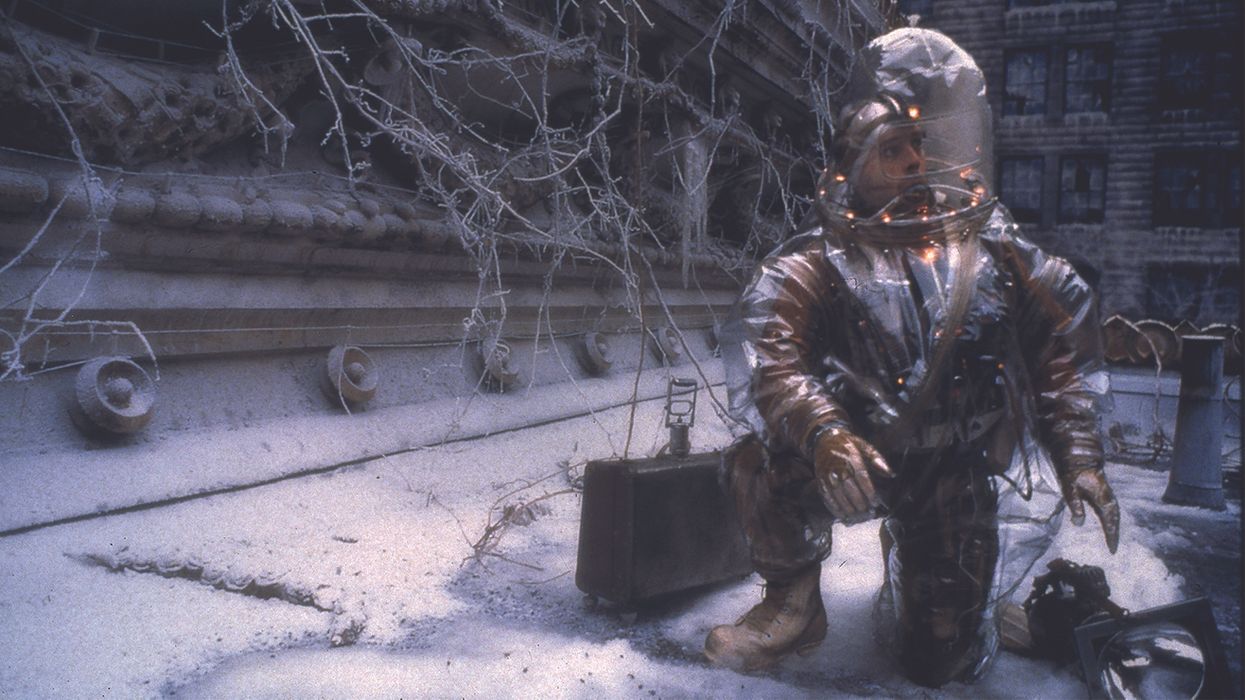Watch: How Terry Gilliam Turned an Avant-Garde Masterpiece into '12 Monkeys'
How does a filmmaker adapt an experimental work into a Hollywood hit without losing its essence?

In 1962, director Chris Marker made La Jetée (The Jetty), an avant-garde science fiction short, a twenty-eight minute journey into the future (and the past). Two decades later, Terry Gilliam would adapt the classic film into 1995's 12 Monkeys, starring Brad Pitt and Bruce Willis. This Renegade Cut video essay compares the two films.
Video essayist Leon Thomas argues that Gilliam's film is "less about the world than about how we see it," and not "the external, but the internal." Gilliam enlarged the deliberately skeletal structure of Marker's work, comprised as it is of still frames and narration, by adding thematic elements for the story to explore, i.e. religion, insanity, faith, and even the idea of human progress. The essay notes, though, that these thematic elements "are not declarations...one can come to a conclusion opposite someone else and still be valid. 12 Monkeys is more like the beginning of a conversation rather than the end, a question, not a conclusion." Gilliam enlarges, and yet maintains, the original, and much of its ambiguity.
You can watch La Jetée' in its entirety here. Jonathan Romney, writing for the Criterion Collection, describes the film's narrative:
An unnamed hero...living in a Parisian postwar radioactive wasteland...[is] sent back in time by scientists to find sustenance or a source of energy...and help save the post-apocalyptic residents of the future (or present, depending where you are.) The film is a Möbius strip, returning paradoxically to its point of origin to swallow its own tail and engender itself once more.
"The march of time is evident in this time travel movie"
In Marker'sfilm, an unnamed hero is sent back to the wrong time, and the same happens to Cole, Willis' character. Disoriented from time travel (and confused by his arrival six years too soon), Cole is quickly arrested and sent to a psych ward, where he tries to convince the doctors of his sanity. They dismiss him, though, in reality, he is totally sane. Brad Pitt's character, however, another patient, is legitimately insane (but, crucially, in between his ravings, he makes several salient points, among them how germs were once considered an "insane" idea.) This prompts the essayist to ask, "If he is right about some things, could he be proven right, in time, about others? We don't have evidence of time travel, but in the film's future it's a reality...the march of time is evident in this time travel movie..."
From Marker's idea of a subterranean world where "civilization" is slowly being reconstituted from the bits and pieces of the past, Gilliam, who also understands that the future never happens all at once, but is cobbled together from bits of yesterday and today (an aesthetic prominent in his film Brazil), has, in 12 Monkeys, constructed an apocalyptic future held loosely with twine.
Besides the themes and scope of the project, the success of Gilliam's adaptation has much to do with his cast. The actors in La Jetée don't really get to act, as they are, for all intents and purposes, models who exist as still pictures—a montage of jagged fragments of memory and half-remembered dreams. In Marker's film, we rely on a narrator for story points. In 12 Monkeys, the performances are uniformly superb: Madeline Stowe, as the psychiatrist who comes to believe in Cole, is graceful and understated; in discussions of the film, her performance gets far less attention than it deserves (probably because it is all of those things.)
Gilliam took Pitt and Willis out of their comfort zones here, and both of them rose to the occasion.
Gilliam also broke the molds in which Pitt and Willis had been stuck: though not yet a full-blown movie star (that would happen a few months later, with the release of Se7en), Brad Pitt was Hollywood's go-to hunky dude, and Willis primarily an action star (who had made an album as well as overseen the vanity debacle that was Hudson Hawk; neither helped his reputation as a serious actor.) Gilliam took the two out of their comfort zones here, and both of them rose to the occasion. Pitt got to flex his acting muscles, and Willis showed a new, melancholic note in his performance that would serve him well in future projects like The Sixth Sense.
Both La Jetée and 12 Monkeys both have conclusions that hinge on classical, tragic irony (SPOILERS AHEAD): each protagonist, in the final moments, realizes that the memories he has from childhood are of himself dying, and that his death has been caused by his own future actions, and will, therefore, endlessly repeat. By extracting the structure and tone from his source, while finding appropriate themes and visuals to compliment and augment them, Terry Gilliam did the (seemingly) impossible in 12 Monkeys: take an avant-garde short, composed of still images, and turn it into a Hollywood hit. Even more importantly is that he did right by Chris Marker and his vision, preserving the essence of La Jetée's genius.
Source: Renegade Cut











